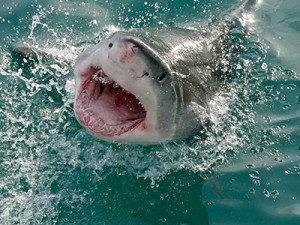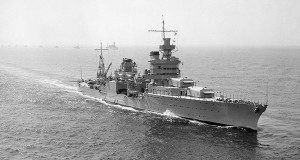[ccfic caption-text format="plaintext"]
By Bill Lombardi
Hometown Weekly Correspondent
I met Bob Bunai many years ago.
Bob was one of the survivors of the sinking of the U.S.S. Indianapolis in World War II. It sank in shark infested waters. I was so interested in learning about it that he invited my wife and me up to his house on Washington St. in West Roxbury. We had an interesting and informative visit.
Bob was working as a bartender in Boston when the Japanese attacked Pearl Harbor on December 7, 1941. A picture his mother took of him in a sailor suit as a teenager influenced Bob to enlist in the Navy when he heard the news.
On the evening of July 29, 1945, Bunai was standing watch on the bridge of the cruiser U.S.S. Indianapolis. A few days before, the ship had delivered, in top secrecy, part of the atomic bomb to Tinian Island in the South Pacific. Even though the Japanese were losing the war badly, they refused to surrender. In order to end it quickly, a decision was made to drop the newly-discovered bomb on Japan’s mainland.Returning to join the fleet after their special task, most of the men on the ship were fast asleep in their bunks on this typical July night, except for the few on duty. The cruiser had no escort as it sailed alone through the moonlit ocean.
It was wartime and the policy was to steer ships on a zigzag course. The captain felt it wasn’t necessary at night, so the cruiser ceased zigzagging after twilight.
A Japanese submarine, cruising on the surface, spoiled something dark-shaped. it submerged and began stalking it with its periscope. As the black figure came closer, the Japanese commander saw it was an enemy ship. It was a few minutes after midnight when he fired his torpedoes at the Indianapolis. Bunai was on the bridge talking to one of his shipmates when the first torpedo struck near the bow. The terrifying explosion knocked him across the room.
When he got up, he saw that he whole front of the ship had been blown away. Another torpedo struck the area where the ammunition was stored. Seconds later, another struck at midship, knocking out the communications system.
Fire and panic spread throughout the critically damaged ship.
The Japanese sailors must have rejoiced as they took turns looking through the periscope at the flames flashing through the burning ship. They probably feared a radio message was sent out, dived to deeper depths and shut off their engines.
Unable to launch any lifeboats, the Indianapolis sank in approximately twelve minutes. Bunai and some of his shipmates wearing Mae West lifejackets jumped over the side and swam away from the ship so they wouldn’t be pulled under by the suction.
Bob remembers hearing the voices of those who were trapped below; their screams told of the horror they were going through. After the ship vanished, everything became pitched black. The survivors were crying and yelling for help. The strong supported the weak and tried to give assurance that help would soon come.
What they didn’t know was that a radio message was never sent out. Bunai said the men’s eyes, irritated from oil, gasoline and salt water, burned with pain.
When daylight came, all one could see were heads bobbing out of the water. The sailors formed groups in an attempt to stay together. Many separated and drifted miles apart. By mid afternoon, all were blinded and tired from the hot sun. Many were delirious from drinking salt water.
One sailor yelled out that his mother had just handed him a glass of cold milk. Another pointed to an imaginary island. This caused mass hallucinations, and some began swimming toward the nonexistent island.
Men fought over lifejackets as their own became waterlogged from long immersion. Everyone was afraid to sleep for fear his jacket would be ripped off. A Catholic priest swam from one group to another, trying to stop the fighting.
The worst was yet to come.
At about noon the following day, shark fins were observed coming towards the men. As they got closer and closer, panic set in and everyone began yelling and thrashing wildly in the water. The fins would disappear under the water, which meant the shark was rolling on his back, ready to attack.

Bob Bunai survived four days and nights in shark-infested waters. Photo courtesy of Wikimedia Commons.
The sailors tried to get away from the blood, as it sent the sharks into a frenzy. When the sharks’ appetites were satisfied, they left only to return the next day to feed off the remaining desperate sailors.
They had been in the water for three and a half days and still, no one came to their rescue.
Lt. Wilbur Gwinn, on a routine flight, spotted oil slicks in the water. When he came down for a closer look, he saw heads sticking out of the water and hands waving frantically.
Bob remembered the feeling that came over him and the others. They weren’t afraid anymore; they were going to be saved. As the plane circled, the men cried with joy. The pilot dropped life rafts and radioed for help. Shortly after, another plane arrived and dropped more life rafts, food rations and water.
That night, rescue ships came and Bob remembered that even thought it was wartime, spotlights lit up the ocean “like Times Square” as rescue operations began. The 316 survivors were amazed when they discovered they had not been reported overdue.
Eight hundred and eighty men died in one of the worst sea tragedies in U.S. naval history. The remaining survivors often met in the city of Indianapolis for reunions. The guest of honor was always Wilbur Gwinn.
When Bob retired, he volunteered his time to Faulkner Hospital and Shriners Hospital, speaking before various organizations describing his ordeal in surviving four days and nights in shark-infested waters.
Bunai had one other claim to fame, as well. He spoke proudly of how he knew Amelia Earhart. When his family came to this country from Syria, they settled on Tyler Street in the South End, right next to the Denison House, where Earhart taught the English language to him, his sisters and other immigrants.
The neighborhood children were thrilled when she took them for rides in her big yellow car. Once in a while, she took them on camping trips. Bob remembers her as friendly, kind and just a beautiful person.
It is ironic that the Indianapolis sank in the same vicinity where the world last heard from Amelia Earhart when she disappeared in July of 1937 on her famous round-the-world flight.
Bob died on September 27, 2011 at the age of 98.
Bill Lombardi is a U.S. Marine Corps veteran. He is the grandfather of Emily, Ashley and Zachary Sullivan, and Cayce and Jimmy Lombardi - all Walpole residents.


























